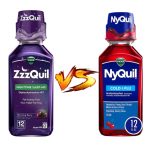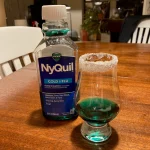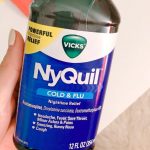Can You Take An Expired NyQuil?

What Is NyQuil?
NyQuil is a popular over-the-counter medication that treats the symptoms of the flu, the common cold, and other similar illnesses and allergies. It is manufactured and sold by Vicks, a U.S. medicine company. NyQuil provides temporary relief for coughing, headaches, stuffy and runny nose, sore throat, fever, and sneezing. It also helps people with cold symptoms sleep through the night. While it provides relief for cold symptoms, it is not a cure for the common cold or the flu. NyQuil is generally safe and effective for adults and children over the age of 6.
What are the ingredients in NyQuil?
There are many different types of NyQuil products on the pharmacy shelves and it may be confusing to know how long each last. One of the most common NyQuil products is NyQuil Cold and Flu Nighttime Relief Liquid.
There are three common active ingredients in NyQuil namely:
• Acetaminophen: is an analgesic that relieves pain and lowers fever by stopping the production of certain chemicals in the brain that causes both pain and fever.
• Dextromethorphan: is a cough suppressant that works in the part of your brain that makes you cough, calming it down and telling your body to cough less.
• Doxylamine: is an antihistamine that works by blocking histamine, a natural chemical in your body that causes congestion, sneezing, and wakefulness.
Does Nyquil Expire?
Yes, Nyquil can expire. An expiration date is a date after which a consumable product such as food or medicine should not be used because it may be spoiled, damaged, or ineffective. Expiration dates are especially important for medications because they offer the only indication about whether the product is still safe to use.
In the late 1970s, the United States Food and Drug Administration (FDA) mandated that all prescription and over-the-counter (OTC) medical products contain an expiration date. Expiration dates for medicines are often marked “EXP” and are printed on the label or stamped onto the medicine bottle or box.
You can easily determine your Nyquil expiration date by lot number or by simply looking at the bottle for the expiration date inscribed on it.
Can you take expired Nyquil?
No, expired Nyquil can hurt you because it is less effective and risky due to a change in chemical composition or a decrease in strength. The expiration date is the final day that the manufacturer guarantees the full potency and safety of a medication.
Drug expiration dates exist on most medication labels, including prescription, over-the-counter (OTC), and dietary (herbal) supplements. U.S. pharmaceutical manufacturers are required by law to place expiration dates on prescription products prior to marketing.
What happens if I drink expired Nyquil?
Expired medications are sub-potent, an expired Nyquil can fail to treat symptoms of the flu, common cold, similar illnesses, and allergies, leading to more serious illnesses. Once the expiration date has passed (usually two to three years after the date of manufacture) there is no guarantee that the medicine will be safe and effective.
If your Nyquil has expired, do not use it. Even though some controversial studies indicate that some drugs can be used after expiry dates, it is better to err on the side of caution in order not to complicate your health condition or trigger unwanted adverse effects.
What are the side effects of taking NyQuil?
Side effects that you should report to your doctor or health care professional as soon as possible:
• allergic reactions like skin rash, itching or hives, swelling of the face, lips, or tongue
• breathing problems
• changes in vision
• confusion
• over excited, nervous, or restless
• problems with balance, talking, walking
• trouble passing urine or change in the amount of urine
• unusual bleeding or bruising
• unusually weak or tired
• yellowing of the eyes or skin
Side effects that usually do not require medical attention (report to your doctor or health care professional if they continue or are bothersome):
• drowsy, tired
• headache
• nausea, stomach upset
This list may not describe all possible side effects. Call your doctor for medical advice about side effects. You may report side effects to FDA at 1-800-FDA-1088.
What may interact with NyQuil?
Do not take NyQuil with any of the following medications:
• MAOIs like Carbex, Eldepryl, Marplan, Nardil, and Parnate
This medicine may also interact with the following medications:
• alcohol
• furazolidone
• imatinib
• isoniazid
• linezolid
• other medicines for cold, cough, or allergy
• other medicines with acetaminophen
• procarbazine
This list may not describe all possible interactions. Give your health care provider a list of all the medicines, herbs, non-prescription drugs, or dietary supplements you use. Also tell them if you smoke, drink alcohol, or use illegal drugs. Some items may interact with your medicine.
What should I watch for while using NyQuil?
Tell your doctor or healthcare professional if your symptoms do not start to get better or if they get worse. Let your doctor know if the pain or cough gets worse or lasts for more than 7 days. Call your doctor if a fever gets worse or lasts for more than 3 days. If a cough does not go away, if a cough comes back, or if it occurs with a rash or headache, see your doctor. Also see your doctor if a sore throat lasts more than 2 days or if it occurs with a fever, rash, headache, nausea, or vomiting.
You may get drowsy, dizzy, or sleepy while taking NyQuil. Do not drive, use machinery, or do anything that needs mental alertness until you know how this medicine affects you. Do not stand or sit up quickly, especially if you are an older patient. This reduces the risk of dizzy or fainting spells. Alcohol may interfere with the effect of this medicine. Avoid alcoholic drinks.
Do not take other medicines that contain acetaminophen with this medicine. Always read labels carefully. If you have questions, ask your doctor or pharmacist.
If you take too much acetaminophen, get medical help right away. Too much acetaminophen can be very dangerous and cause liver damage. Even if you do not have symptoms, it is important to get help right away.





